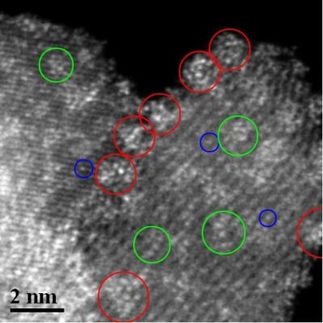Room Temperature Liquid Porphyrins: Potential Optical Limiters
Advertisement
porphyrins have received a great deal of attention in the scientific community owing to their useful application in a wide variety of areas, such as the treatment of cancer and systems that mimic photosynthesis. A common shortcoming observed in using porphyrins arises from their tendency to form stacks and aggregates, as is common for planar aromatic systems, which results in low solubility, high crystallinity, and high melting point. In the journal Chemistry—An Asian Journal, a team led by Daniel T. Gryko, based at the Polish Academy of Sciences (Warsaw, Poland), describe the design and synthesis of liquid porphyrin-based compounds that, after suitable structural modifications, may be used as optical limiters.
The study focuses on a homologous series of meso-substituted A4-porphyrins bearing aryl groups with long alkoxy chains. The alkyl chain length ranges from 8 to 18 carbon atoms. The synthesis of these compounds involves a high-yielding two-step process using commercially available starting materials. All porphyrins synthesized are found to be highly soluble in organic solvents. Differential scanning calorimetry (DSC) is used to investigate the thermal properties of the series of porphyrins.
"The behavior of the compounds in the DSC thermograms is very sensitive to the alkoxy chain lengths present in the molecule" writes Gryko. A gradual decrease in the temperature for the crystalline-to-isotropic-liquid phase transition is observed as the length of the alkoxy side chains increase. A minimum is observed for the decycloxy compound, with subsequent elongation of the alkyl chain causing an increase in the melting point. 5,10,15,20-Tetrakis[3,4,5-tri(undecyloxy)phenyl]porphyrin and its decyloxy analogue are both observed to be liquids at room temperature and are shown to have melting points of -24°C and -55°C, respectively.
Such compounds are unprecedented, and these results provide significant insight into the possibilities for the design and synthesis of room temperature liquid porphyrins in a very simple and efficient way. It is known that liquid porphyrins maintain the same spectroscopic features as their solid analogues, therefore, this discovery not only opens the way to design porphyrins possessing such substituents in optical limiting devices but also allows its broader use in other applications where liquidity or very high solubility are desirable.
Original publication: Daniel T. Gryko et al.; "Meso-Substituted Liquid Porphyrins"; Chemistry—An Asian Journal 2010, 5, No. 4.
Other news from the department science
Most read news
More news from our other portals
See the theme worlds for related content
Topic world Synthesis
Chemical synthesis is at the heart of modern chemistry and enables the targeted production of molecules with specific properties. By combining starting materials in defined reaction conditions, chemists can create a wide range of compounds, from simple molecules to complex active ingredients.

Topic world Synthesis
Chemical synthesis is at the heart of modern chemistry and enables the targeted production of molecules with specific properties. By combining starting materials in defined reaction conditions, chemists can create a wide range of compounds, from simple molecules to complex active ingredients.































































